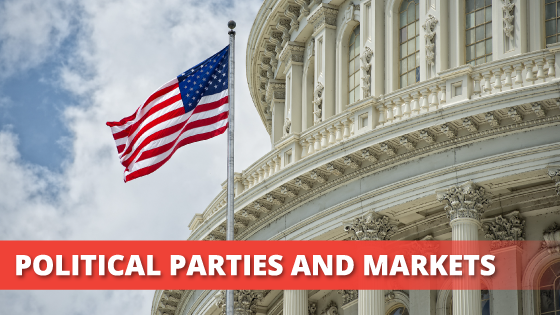Many presidents like to take credit for strong stock market performance. And certainly, poor performance is a common thread of attack for presidential challengers. Yet, when you look at the data, presidents themselves don’t impact stock market performance as much as you may think. However, politics play a role in stock market performance in unexpected ways.
Let’s take a look at a few ways that political parties influence the markets and how investors can adjust their portfolios in response.
Looking Through the Right Lens
Calvin Coolidge became president in 1923 at the very beginning of the 1920s. Driven by deferred spending after the war, there was a binge in construction and consumer spending that led to a six-fold rise in the market. Coolidge’s hands-off approach to government fueled the binge, making him the best-performing president with 26.1% annualized gains.
By 1929, many ordinary Americans had become interested in the stock market, purchased stock on margin and stretched valuations. Herbert Hoover became president just before the infamous 1929 stock market crash and subsequent Great Depression, making him the worst-performing president with a 30.8% annualized compound loss during his tenure.
The moral of the story is that investors should take presidential stock market performance with a grain of salt. Coolidge’s lack of government involvement in the economy could have been responsible for the asset bubble that ultimately led to the Great Depression even if the bubble didn’t pop until the next administration was in office—who was really responsible?
Politics Plays an Unexpected Role
Investors shouldn’t simply ignore politics even though the political party in power may not neatly correlate with stock market performance. A Republican tax cut or Democratic infrastructure spending bill will certainly influence the markets in predictable ways, although these moves don’t occur in a vacuum, and investors must consider the whole picture.
Tax changes tend to have one of the greatest influences on stock market performance, but not in the way that many investors would expect. Since 1950, the S&P 500 has shown higher returns and higher odds of advance in times when taxes were moving higher. The reason is that tax increases tend to come along with significant government stimulus spending and rising interest rates.
How unified vs. split Congress impacts performance – Source: CFRA via CNBC
The market also tends to favor the status quo when it comes to policy—that is, performance is better when there’s less risk of major change. Average annual stock returns have been higher (17.2%) under a split Congress than under a Republican (13.4%) or Democrat (10.7%) controlled Congress when looking back over the last 80 years.
Of course, there are several instances where near-term politically motivated actions can influence the markets. A trade war that involves the exchange of tariffs on goods and services tends to be very bad for the market, although politicians may use tariffs as a way to correct unfair trade practices to show political strength against an adversary.
Politics Beyond the Border
Political risk is a much larger factor in international investment decisions. In particular, frontier and emerging market investments tend to be the most susceptible to political risks. Unstable economies can jeopardize a country’s ability to pay on sovereign debt, runaway inflation can devastate earnings and nationalization might put certain companies at risk.
There are plenty of examples of these risks in action:
- The European sovereign debt crisis of 2009 resulted in a spillover from Greece to Italy, Spain and other countries with weak credit ratings.
- Venezuela famously nationalized a number of oil projects worth $30 billion in 2007 along with a major gas project in 2009.
- Argentina experienced a steep devaluation of the Argentine Peso in 2018, caused by high inflation, resulting in lower real earnings.
Investors should be mindful of these risks when investing in individual foreign companies or funds concentrated in high-risk markets. While these situations may provide above-market return potential, the risks may outweigh the benefits and make for a lower risk-adjusted return than investments in a well-rounded portfolio or developed markets.
Hedging Against Political Risks
Politics may affect market performance in several ways, but it’s not as easy as buying stock under a Republican administration, selling under a Democratic administration and avoiding emerging markets. You have to take a holistic look at the market, risks to your specific investments, specific policies under consolidation and their likelihood of success.
For instance, a tax increase on the wealthy paired with significant government spending could result in strong stock market performance and a shift into tax-advantaged municipal bonds in the near-term for the wealthy. Investors may also want to consider the prospect of rising inflation and interest rates, which could suggest a move away from conventional government bonds.
The best hedge against political risks over the long-term is a diversified portfolio—both in terms of industries and geography. A portfolio with significant international allocations can help minimize the impact of U.S. policy decisions while diversification across different sectors and asset classes can help even out returns and keep volatility in check.
The Bottom Line
Politics play an important role in stock market performance, but not in the way that many investors would expect. When assessing political risk, investors should take a holistic view rather than looking at purely politics and make targeted adjustments to their portfolio based on policies that are likely to become law rather than speculation. Politics, like many other aspects of the market, are unpredictable. Even positive policy changes can generate unexpected outcomes in the market. A good investment strategy won’t rely on who is in power or a particular political party.
If you’re looking for an alternative to conventional fixed-income investments, Snider Advisors provides an easy-to-use strategy to generate income from covered call options. The Snider Investment Method and Lattco platform make it easy to identify opportunities and quickly act on them to generate a monthly income in retirement.







